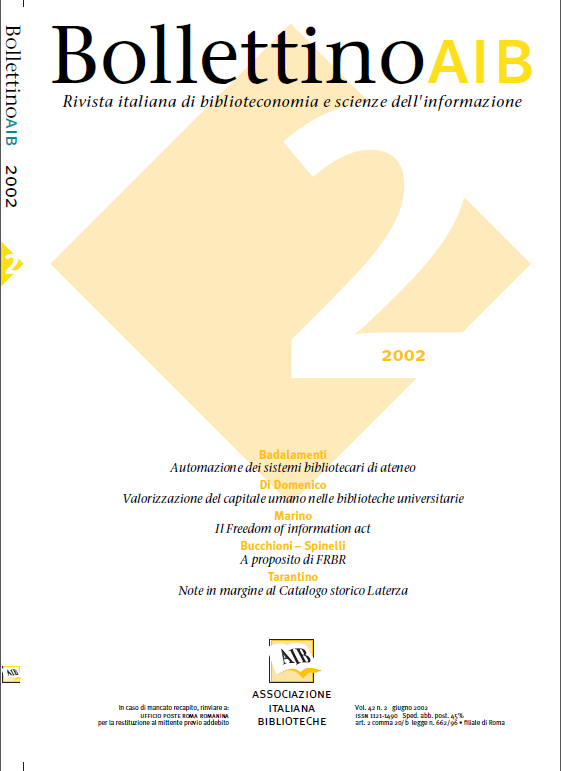The development of human capital: arrangement, responsibilities and functions of librarians in universities
Main Article Content
Abstract
My intervention takes its cue from a contribution by Serafina Spinelli on university cooperation. It is a very clear and detailed analysis in which the origins and short historical path of university library systems are reconstructed and their current configuration is summed up. Some possible lines of development of the matter are also presented and some challenges to be faced are indicated. These challenges include the organizational redesigning of the library systems, the necessity to increase the rate of effectiveness of the cooperation, the problems regarding digital libraries, projection towards the exterior of the library profession in universities and even of the library systems: something that originates from the new requirements of organization of knowledge and scientific communication in universities.
A large number of these processes can be interpreted together as a sort of mission for inter-university coordination. They are complex processes, which demand new levels of professionalism and autonomy, therefore a clear and strong redefinition of the skills (understood as collections of knowledge, abilities and indentities) and of the functions of university librarians. And they are processes to be positioned within the macro-scenarios of the totality, of the new competitive and instable contexts, in which universities also operate. After all, and more generally speaking, it is precisely around the central position of the skills (individual and organizational), the capacity to integrate diversified skills (internal and external to the organizations), the development of the professions within the organizations, in short it is around the use of knowledge as a primary organizational resource, that a service society can be born and be consolidated. There is moreover a negative pendant, which involves the high level professionalisms and more advanced sectors: that which is called skill shortage, lack of necessary skills, deficit of skills on the market. This is a phenomenon of considerable dimensions, which forces reflections on the theme of high-level formation, which makes prospects of permanent formation essential and, finally, forces a reclassification of existing professions, closely connected with the start of wide-ranging and long ranging formation processes.
How do Italian universities respond? With a series of reform processes in the sign of autonomy, those which we all know and daily experience and which at this time bring didactic autonomy to the fore; they also repond with the start of an overall revision of their organizational set-up.
The latest National Collective Contract of Work (CCNL) of the technical administrative personnel is an important stage along this path.
A large number of these processes can be interpreted together as a sort of mission for inter-university coordination. They are complex processes, which demand new levels of professionalism and autonomy, therefore a clear and strong redefinition of the skills (understood as collections of knowledge, abilities and indentities) and of the functions of university librarians. And they are processes to be positioned within the macro-scenarios of the totality, of the new competitive and instable contexts, in which universities also operate. After all, and more generally speaking, it is precisely around the central position of the skills (individual and organizational), the capacity to integrate diversified skills (internal and external to the organizations), the development of the professions within the organizations, in short it is around the use of knowledge as a primary organizational resource, that a service society can be born and be consolidated. There is moreover a negative pendant, which involves the high level professionalisms and more advanced sectors: that which is called skill shortage, lack of necessary skills, deficit of skills on the market. This is a phenomenon of considerable dimensions, which forces reflections on the theme of high-level formation, which makes prospects of permanent formation essential and, finally, forces a reclassification of existing professions, closely connected with the start of wide-ranging and long ranging formation processes.
How do Italian universities respond? With a series of reform processes in the sign of autonomy, those which we all know and daily experience and which at this time bring didactic autonomy to the fore; they also repond with the start of an overall revision of their organizational set-up.
The latest National Collective Contract of Work (CCNL) of the technical administrative personnel is an important stage along this path.
Article Details
Section
Articles

This work is licensed under a Creative Commons Attribution-ShareAlike 4.0 International License.
